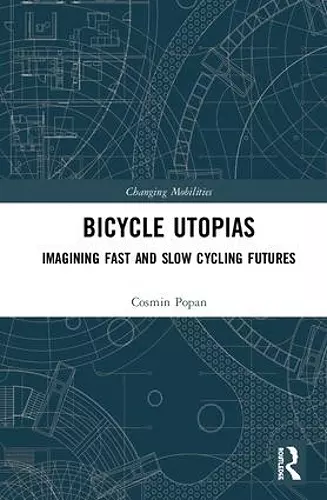Bicycle Utopias
Imagining Fast and Slow Cycling Futures
Format:Hardback
Publisher:Taylor & Francis Ltd
Published:4th Dec '18
Currently unavailable, and unfortunately no date known when it will be back
This hardback is available in another edition too:
- Paperback£43.99(9780367582241)

Bicycle Utopias investigates the future of urban mobilities and post-car societies, arguing that the bicycle can become the nexus around which most human movement will revolve. Drawing on literature on post-car futures (Urry 2007; Dennis and Urry 2009), transition theory (Geels et al. 2012) and utopian studies (Levitas 2010, 2013), this book imagines a slow bicycle system as a necessary means to achieving more sustainable mobility futures.
The imagination of a slow bicycle system is done in three ways:
- Scenario building to anticipate how cycling mobilities will look in the year 2050.
- A critique of the system of automobility and of fast cycling futures.
- An investigation of the cycling senses and sociabilities to describe the type of societies that such a slow bicycle system will enable.
Bicycle Utopias will appeal to students and scholars in fields such as sociology, mobilities studies, human geography and urban and transport studies. This work may also be of interest to advocates, activists and professionals in the domains of cycling and sustainable mobilities.
What might an urban cycling future look like? This book makes a unique contribution to the sociology of mobilities and mobile methods with a critical and creative examination of where we are and where we could be. Popan questions the normative dominance of ‘fast’ urban mobilities, namely the utopian promise of the car, with his thorough and in-depth analysis of ‘slow’ cycling cultures. This timely investigation of post-automobility futures challenges the reader to imagine the possibilities of different sensory, embodied and social worlds.
Kat Jungnickel, Goldsmiths, University of London, author of Bikes and Bloomers: Victorian Women Inventors and Their Extraordinary Cycle Wear
This book impressively explores so many dimensions of changing bicycle mobilities—among them economics, policy, cultural meaning, embodiment, identity, sociability, and technology—that it is a must-read. It is also a unique and forward-thinking book, weaving together innovative methods, critical analysis, and utopian thinking to envision a future ‘slow bicycle system,’ and, more importantly, the actions and changes necessary in the present to construct that future. Cosmin Popan is a sophisticated guide through these complicated issues, and one cannot but admire the ambition and accomplishment here.
Luis Vivanco, University of Vermont, author of Reconsidering the Bicycl
ISBN: 9781138389182
Dimensions: unknown
Weight: 453g
202 pages